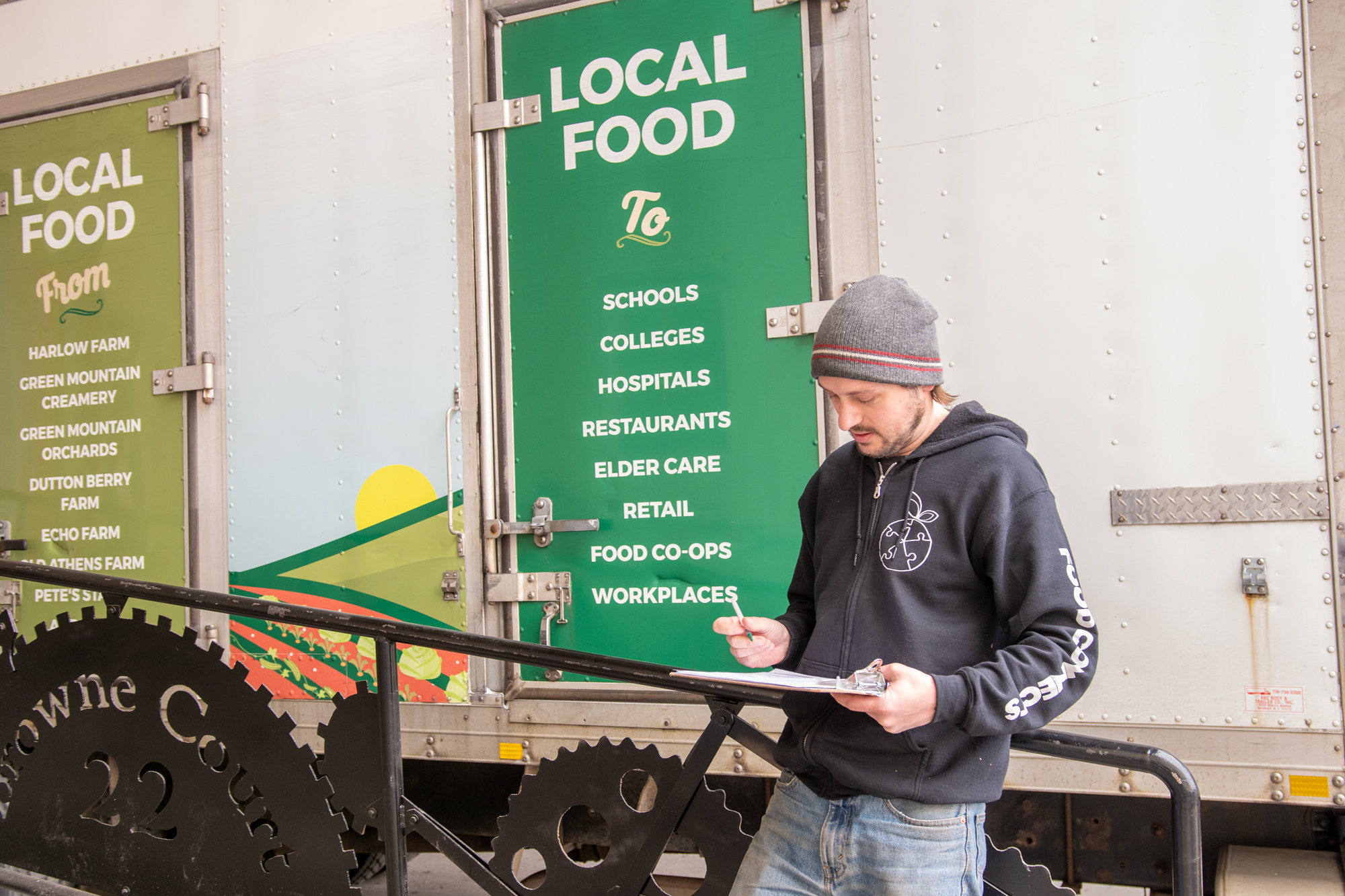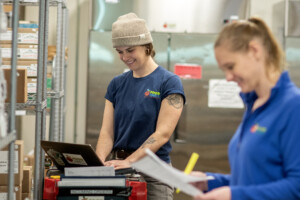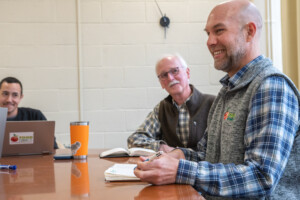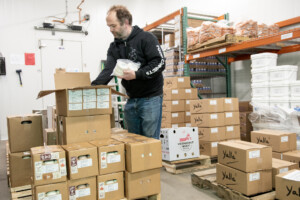Creating a Regional Food System, One Warehouse at a Time
October 04, 2023

Food Connects in Brattleboro, Vt. is among a group of New England food hubs that are building a sustainable, regional supply chain.
Richard Berkfield, executive director of Food Connects, has a vision that someday soon, Vermont farmers and food producers will be able to supply more food to more people in the region. In doing so, farms and small businesses will thrive and people will have access to healthy, affordable, locally produced food–especially those living in rural areas where food is grown, but not always available.
While that vision may call to mind verdant farms and colorful produce, for Berkfield, at the moment it’s about warehouses and refrigeration.
“In between national distributors and large, industrial farms lies an extensive infrastructure network that keeps food fresh while it moves around the country,” he explains. “And that infrastructure is expensive to replicate on a smaller scale. It’s been a sticking point for local food hubs.”

Food Connects works to be a leader in strengthening the movement for community-based food systems throughout New England, building healthy families, thriving farms and communities. Photo by Erica Houskeeper.
While those larger, centralized systems are efficient–with huge warehouses, big grocery chains, and industrial food producers–what COVID showed us, says Berkfield, is that they’re not very resilient. That point was reiterated after the flooding this summer, he says. “There were empty shelves in stores that could have been filled by in-stock products from the Food Connects warehouse. Big distributors were focused on their larger, more profitable customers.”
“Recent events, especially the pandemic, have shifted customer understanding of supply chains,” said Berkfield. “There is more awareness, interest, and acknowledgment now that a supply chain is a thing. I don’t think most people thought much about supply chains, but that changed when national distributors couldn’t deliver food and smaller, regional distributors could. Now I hear people talking about wanting to shorten supply chains and take more control.”
He points to the example of Vermont cheeses, which replaced imported cheeses at grocery stores during the pandemic. “In most cases, those Vermont cheeses have stayed,” he said. “People realized they could support local farmers and cheesemakers and still enjoy great cheese. Why go back to shipping it around the world when we have it right here?”
That awareness has fueled a spike in growth at Food Connects and other food hubs in recent years, which in turn has sparked a regional discussion about using that momentum to create a regional food supply chain. “That’s our big why,” said Berkfield. “To create a sustainable, reliable regional supply chain that includes smaller farms and producers, independent grocery stores, and rural institutions.”
A Community-Based Food Supply Chain
In the early days, Food Connects was a fairly simple organization. Generally, the farms, orchards, and food producers were within a 30-mile radius of the food co-op or local school where their products were delivered. “It started with this realization that the Putney Central School, which is a mile away from Green Mountain Orchards, was not serving Green Mountain Orchard apples,” said Berkfield, whose children attended the school. “It was a very blatant example that there was something wrong with the existing distribution network. We started there.”
As the organization celebrates its ten year anniversary this year, however, that simple equation has changed.
“We’ve been hearing from our farm partners over the years that mainstream distribution isn’t working for them anymore,” he said. “Sales volumes have gone down and fees have gone up, and we’re seeing an erosion in our rural economies as a result. A smaller, decentralized distribution system is more resilient and more community based,” he said. “For me, it’s part of making sure that we’ve got a rural landscape that’s working for people.”
After much discussion and deliberation with colleagues in the Farm to Plate Network, the Governor’s Commission on the Future of Vermont Agriculture, and his stakeholders–the farmers and food producers who supply Food Connects with product– Berkfield has decided to take a decisive step toward building the infrastructure needed to support that vision. He recently launched a capital campaign to expand into and outfit a 10,000 square foot warehouse in Brattleboro, Vermont.
“We’re in a very strategic location in Brattleboro,” he said. “It’s a calculated risk and a big need, but we’re already in operation, we have trucks on the road, we have relationships with customers, we have systems in place–it felt like we could take the leap.”
“Our producers are telling us that they could deliver more, lower their prices, and be more efficient if there was a place for them to store their product,” he said. “So we are building out the space with the expectation that when we pick up food that has already been sold, we can also store food for the producer to sell later, or make that food available to another distributor. That’s the new part of our business model that’s really serving the producer as they work to reach new markets.”
Food Connects is currently a $3+ million operation. With the new warehouse space and the marketing efforts underway through Vermont Way Foods to promote Vermont producers regionally, Berkfield projects they could grow to $10 million. “We’d be talking pallets, not cases,” he said.
Growth, Opportunity, and Overwhelm
Seeing that potential to play a bigger role in the food system, Berkfield reached out to the Vermont Sustainable Jobs Fund (VSJF) business coaching program to help him create a plan. “I had to own that I didn’t know how to build or support a team for a ten million dollar organization,” he said. “Having coaching has been really important, really helpful.”
Through funding from the Vermont Small Business Development Center’s Community Navigator Pilot Program (CNPP), Berkfield was connected with VSJF coach Victor Morrison. “With that level of growth and opportunity, there was also overwhelm,” said Morrison. “Everything feels important. But Richard really cares about getting good food to people and creating a system that is smart and efficient.”

Richard Berkfield, executive director of Food Connects, right, at a business coaching meeting in April with VSJF business coach Victor Morrison and staff. Photo by Erica Houskeeper.
For years, Berkfield had toyed with the idea of an advisory board, but struggled to define a clear purpose. Through conversation with Victor, he was able to get focused on what he wanted from a board and think about who would provide the guidance he needed. “Knowing the purpose made it easier to ask,” he said. “And, I got all the people I had wanted to bring on for a long time.”
Often, his work with Morrison was “therapy,” according to Berkfield. “Just having somebody to talk to when you have challenges and don’t want to burden your team,” he said. “It helps you understand the challenge and be aware of what might be ahead. To have a coach that has experience is super helpful. We’re not the first enterprise to go through growth. There are stages, and there are frameworks that help me to understand it.”
“Richard has the answers,” said Morrison. “Sometimes entrepreneurs and CEOs just need someone to walk beside them, help them work through decisions, until they get their momentum.”
New Ways to Partner and Collaborate
While those answers may not always be easy to find, Berkfield and others are moving forward with their vision of a thriving, regional food network. Food Hubs from New England and New York are finding new ways to collaborate, buying products from each other to sell in their own market and connecting out-of-state Food Hubs with local farmers and producers who are ready to scale.
Yalla Hummus, based in Brattleboro is one example. Food Connects partners with other food hubs to make the hummus available in other areas. “We can’t deliver to all these different places efficiently, but we can find ways to partner and negotiate on pricing and costs,” said Berkfield. “There are a variety of ways it can play out. We try to be open minded and find creative ways to make it work.”

Warehouse Manager Raymond Johnston reviews inventory in a cooler at Food Connects. Photo by Erica Houskeeper.
It’s helping small companies like Yalla, whose product Food Connects delivered to almost 50 stores and farm stands in Vermont, New Hampshire, and Massachusetts in 2023, while keeping the bigger picture in mind that keeps Berkfield moving forward.
“It’s a regional food system that supports entrepreneurs, farmers, and food producers of all types,” he said. “It’s helping small producers sell to more stores in more states, opening up new markets for larger farms and orchards that are ready to grow, and getting locally grown grains to bakers. It’s even bringing seafood up from the coast, so we can have fresh-caught, frozen seafood here in Vermont and know which boat it came from, just like we know which farmer grew our vegetables.”
“There are exciting collaborations happening that are helping to create a new food system,” he said, “that we hope will make it easier for people to buy local brands from New England instead of mainstream products from large conglomerates.”
About VSJF’s Business Management Coaching Program
The Vermont Sustainable Jobs Fund provides tailored, high-touch planning, coaching, and advising for business owners and their management teams to advance profitability, job creation, and sustainable job development. Click for more information about business management coaching. Funding support for our coaching program is provided by client fees, the SBA-Community Navigator Pilot Program, the Vermont Agency of Agriculture, Food and Markets, and Vermont Housing & Conservation Board’s Farm & Forest Viability Program.
Read More Stories Like This:
- The Roots Farm Market Brings a New Approach to the Old General Store
- Babette’s Table: Using Projections to Grow with Intention
- Bobolink Yarns: Scaling Back to Find Success
- Hemp and Cannabis Pioneer, Scott Sparks, Navigates Legalization in Vermont
- Business Sense Training Series for Entrepreneurs and Small Business Owners
- Pioneers of African Cuisine, Global Village Foods Finds Community in Vermont




